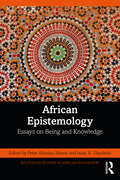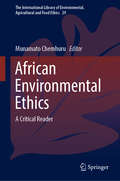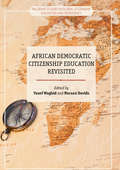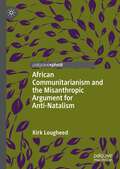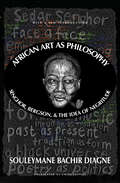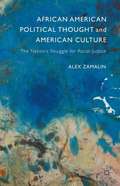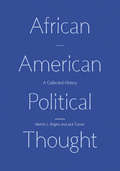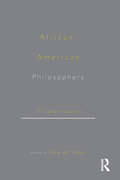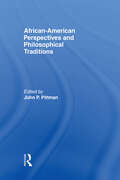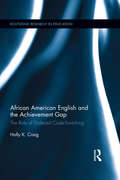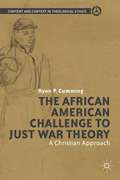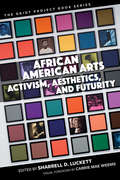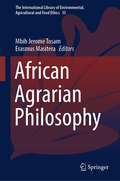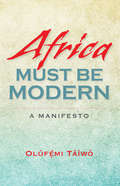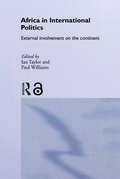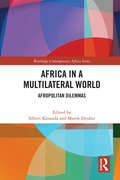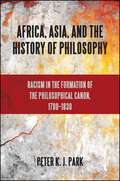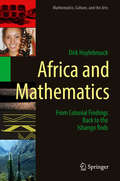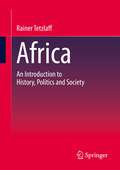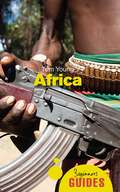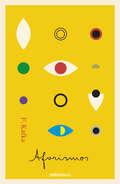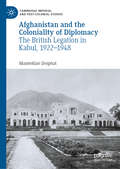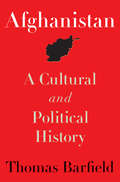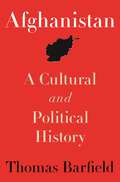- Table View
- List View
African Epistemology: Essays on Being and Knowledge (Routledge Studies in African Philosophy)
by Peter Aloysius Ikhane Isaac E. UkpokoloThis book investigates how knowledge is conceived and explored within the African context. Epistemology, or the theory of knowledge, has historically been dominated by the Western approach to the discourse of knowledge. This book however shines a much-needed spotlight on knowledge systems originating within the African continent. Bringing together key voices from across the field of African philosophy, this book explores the nature of knowledge across the continent and how they are rooted in Africans’ ontological sense of being and self. At a time when moves to decolonize curricula are gaining momentum, this book shows how understanding the specific ways of knowing that form part of the every day life of the African, will play an important part in rebalancing studies of philosophy globally. Employing critical, conceptual and rigorous analyses of the nature and essence of knowledge as understood by indigenous African societies, the book ultimately asks what could pass as an African theory of knowledge. This important guide to the connections between knowledge and being, in African philosophical thought, will be an important resource for researchers and students of philosophy and African studies.
African Environmental Ethics: A Critical Reader (The International Library of Environmental, Agricultural and Food Ethics #29)
by Munamato ChemhuruThis book focuses on under-explored and often neglected issues in contemporary African environmental philosophy and ethics. Critical issues such as the moral status of nature, African conceptions of animal moral status and rights, African conceptions of environmental justice, African relational Environmentalism, ubuntu, African theocentric and teleological environmentalism are addressed in this book. It is unique in so far as it goes beyond the generalized focus on African metaphysics and African ethics by exploring how these views might be understood differently in order to conceptualize African environmental ethics. Against the background where environmental problems such as pollution, climate change, extinction of flora and fauna, and global warming are plain to see, it becomes useful to examine how African conceptions of environmental ethics could be understood in order to confront some of these problems facing the whole world. This book will be of value to undergraduate students, graduate students and academics working in the area of African Philosophy, African Environmental Ethics and Global Ethics in general.
African Democratic Citizenship Education Revisited (Palgrave Studies in Global Citizenship Education and Democracy)
by Nuraan Davids Yusef WaghidThis edited collection explores how democratic citizenship education manifests across the African continent. A recognition of rights and responsibilities coupled with an emphasis on deliberative engagement among citizens, while not uniquely African, provides ample evidence that the concept can most appropriately be realised in relation to its connectedness with experiences of people living on the continent. Focussing on a diverse collection of voices, the editors and authors examine countries that have an overwhelming allegiance to democratic citizenship education. In doing so, they acknowledge that this concept, enveloped by a certain Africanness, has the potential to manifest in practices across the African continent. By highlighting the success of democratic citizenship education, the diverse and varied contributions from across this vast continent address the malaise in its implementation in countries where autocratic rule prevails. This pioneering volume will be an invaluable resource for researchers and students working in the fields of education and sociology, particularly those with an interest in education policy, philosophy of education and global citizenship initiatives.
African Communitarianism and the Misanthropic Argument for Anti-Natalism
by Kirk LougheedAnti-natalism is the provocative view that it is either always or almost always all-things-considered wrong to procreate. Philanthropic anti-natalist arguments say that procreation is always impermissible because of the harm done to individuals who are brought into existence. Misanthropic arguments, on the other hand, hold that procreation is usually impermissible given the harm that individuals will do once brought into existence. The main purpose of this short monograph is to demonstrate that David Benatar’s misanthropic argument for anti-natalism ought to be endorsed by any version of African Communitarianism. Not only that, but there are also resources in the African philosophical tradition that offer unique support for the argument. Given the emphasis that indigenous African worldviews place on the importance of procreation and the immediate family unit this result is highly surprising. This book marks the first attempt to bring anti-natalism into conversation with contemporary African ethics.
African Art as Philosophy: Senghor, Bergson, and the Idea of Negritude
by Souleymane Bachir DiagneThis critically acclaimed study offers a distinct, incisive look at how Senegalese philosopher Senghor sees in African art the most acute expression of Bergson&’s philosophy.Léopold Sédar Senghor (1906–2001) was a Senegalese poet and philosopher who in 1960 also became the first president of the Republic of Senegal. In African Art as Philosophy, Souleymane Bachir Diagne uses a unique approach to reading Senghor&’s influential works, taking as the starting point for his analysis Henri Bergson&’s idea that in order to understand philosophers, one must find the initial intuition from which every aspect of their work develops. In the case of Senghor, Diagne argues that his primordial intuition is that African art is a philosophy.To further this point, Diagne looks at what Senghor called the &“1889 Revolution&” (the year Bergson&’s Time and Free Will was published), as well as the influential writers and publications of that period—specifically, Nietzsche and Rimbaud. The 1889 Revolution, Senghor claims, is what led him to the understanding of the &“Vitalism&” at the core of African religions and beliefs that found expression in the arts.
African American Political Thought and American Culture: The Nation's Struggle For Racial Justice
by Alex ZamalinThis book demonstrates how certain African American writers radically re-envisioned core American ideals in order to make them serviceable for racial justice. Each writer's unprecedented reconstruction of key American values has the potential to energize American citizenship today.
African American Political Thought: A Collected History
by Jack Turner Melvin L. RogersAfrican American Political Thought offers an unprecedented philosophical history of thinkers from the African American community and African diaspora who have addressed the central issues of political life: democracy, race, violence, liberation, solidarity, and mass political action. Melvin L. Rogers and Jack Turner have brought together leading scholars to reflect on individual intellectuals from the past four centuries, developing their list with an expansive approach to political expression. The collected essays consider such figures as Martin Delany, Ida B. Wells, W. E. B. Du Bois, James Baldwin, Toni Morrison, and Audre Lorde, whose works are addressed by scholars such as Farah Jasmin Griffin, Robert Gooding-Williams, Michael Dawson, Nick Bromell, Neil Roberts, and Lawrie Balfour. While African American political thought is inextricable from the historical movement of American political thought, this volume stresses the individuality of Black thinkers, the transnational and diasporic consciousness, and how individual speakers and writers draw on various traditions simultaneously to broaden our conception of African American political ideas. This landmark volume gives us the opportunity to tap into the myriad and nuanced political theories central to Black life. In doing so, African American Political Thought: A Collected History transforms how we understand the past and future of political thinking in the West.
African-American Philosophers: 17 Conversations
by George YancyAfrican-American Philosophers brings into conversation seventeen of the foremost thinkers of color to discuss issues such as Black existentialism, racism, Black women philosophers within the academy, affirmative action and the conceptual parameters of African-American philosophy.
African-American Perspectives and Philosophical Traditions
by John P. PittmanFirst published in 1997. Routledge is an imprint of Taylor & Francis, an informa company.
African American English and the Achievement Gap: The Role of Dialectal Code Switching (Routledge Research in Education)
by Holly K. CraigMany African American children make use of African American English (AAE) in their everyday lives, and face academic barriers when introduced to Standard American English (SAE) in the classroom. Research has shown that students who can adapt and use SAE for academic purposes demonstrate significantly better test scores than their less adaptable peers. Accordingly, AAE use and its confirmed inverse relationship to reading achievement have been implicated in the Black-White Test Score Gap, thus becoming the focus of intense research and practical interest. This volume discusses dialectal code-switching from AAE to SAE and stresses the benefits and importance of African American students becoming bi-dialectal. It provides background theory and science supporting the most promising educational approach to date, Contrastive Analysis, a set of longstanding methods drawn from Second Language research and used effectively with students ranging from kindergarten through college. It offers a deeper knowledge of AAE use by students, the critical features of Contrastive Analysis, and detailed information about successful applications which teachers can apply in their own pedagogy.
The African American Challenge to Just War Theory
by Ryan P. CummingIn this innovative treatment of the ethics of war, Ryan P. Cumming brings classical sources of just war theory into conversation with African American voices. The result is a new direction in just war thought that challenges dominant interpretations of just war theory by looking to the perspectives of those on the underside of history and politics.
African American Arts: Activism, Aesthetics, and Futurity (The Griot Project Book Series)
by Sharrell D. Luckett Carmen Gillespie Rikki Byrd Amber Lauren Johnson Doria E. Charlson Florencia V. Cornet Daniel McNeil Lucy Caplan Genevieve Hyacinthe Sammantha McCalla Nettrice R. Gaskins Abby Dobson J. Michael Kinsey Shondrika Moss-Bouldin Julie B. Johnson Jasmine Eileen Coles Tawnya Pettiford-Wates Rickerby HindsSignaling such recent activist and aesthetic concepts in the work of Kara Walker, Childish Gambino, BLM, Janelle Monáe, and Kendrick Lamar, and marking the exit of the Obama Administration and the opening of the National Museum of African American History and Culture, this anthology explores the role of African American arts in shaping the future, and further informing new directions we might take in honoring and protecting the success of African Americans in the U.S. The essays in African American Arts: Activism, Aesthetics, and Futurity engage readers in critical conversations by activists, scholars, and artists reflecting on national and transnational legacies of African American activism as an element of artistic practice, particularly as they concern artistic expression and race relations, and the intersections of creative processes with economic, sociological, and psychological inequalities. Scholars from the fields of communication, theater, queer studies, media studies, performance studies, dance, visual arts, and fashion design, to name a few, collectively ask: What are the connections between African American arts, the work of social justice, and creative processes? If we conceive the arts as critical to the legacy of Black activism in the United States, how can we use that construct to inform our understanding of the complicated intersections of African American activism and aesthetics? How might we as scholars and creative thinkers further employ the arts to envision and shape a verdant society? Contributors: Carrie Mae Weems, Carmen Gillespie, Rikki Byrd, Amber Lauren Johnson, Doria E. Charlson, Florencia V. Cornet, Daniel McNeil, Lucy Caplan, Genevieve Hyacinthe, Sammantha McCalla, Nettrice R. Gaskins, Abby Dobson, J. Michael Kinsey, Shondrika Moss-Bouldin, Julie B. Johnson, Sharrell D. Luckett, Jasmine Eileen Coles, Tawnya Pettiford-Wates, Rickerby Hinds. Published by Bucknell University Press. Distributed worldwide by Rutgers University Press.
African Agrarian Philosophy (The International Library of Environmental, Agricultural and Food Ethics #35)
by Mbih Jerome Tosam Erasmus MasiteraThis book critically explores indigenous sub-Saharan African agrarian thought. Indigenous African agrarian philosophy is an uncharted and largely overlooked area of study in the burgeoning fields of African philosophy and philosophy of nature. The book shows that wherever human beings have lived, they have been preoccupied with exploring ways to ensure the sustainable management of limited resources at their disposal, to attain to their basic needs: food, shelter, and security. The book also shows that agriculture and the way people relate with nature are an essential, but generally neglected, determinant of the emergence and orientation of all philosophical traditions. In traditional, pre-colonial African culture, it was difficult to separate agriculture from African relational ontology. Agriculture and the use of natural resources were at the centre of community life and influenced the social, political, economic, and spiritual worldviews of the people. In their contact with nature through agriculture, different beliefs, knowledge systems, norms, moral outlooks, cultural practices and institutions emerged and have been valorized to guide societies on how to sustainably manage the environment. As a way of life, then, agriculture was deeply connected with indigenous beliefs, values, and practices which transcended a wide range of issues related to ecological ethics, food ethics, religion, traditional medicine, political economy, social organisation, biological reproduction and species survival, indigenous knowledge, and property rights. This book will thus be a valuable resource for policy makers and researchers in diverse fields such as philosophy, geography, sociology, anthropology, and development studies.
Africa Must Be Modern
by Olúfemi TáíwòIn a forthright and uncompromising manner, Olúfémi Táíwò explores Africa's hostility toward modernity and how that hostility has impeded economic development and social and political transformation. What has to change for Africa to be able to respond to the challenges of modernity and globalization? Táíwò insists that Africa can renew itself only by fully engaging with democracy and capitalism and by mining its untapped intellectual resources. While many may not agree with Táíwò's positions, they will be unable to ignore what he says. This is a bold exhortation for Africa to come into the 21st century.
Africa in International Politics: External Involvement on the Continent (Routledge Advances in International Relations and Global Politics)
by Ian Taylor Paul WilliamsLocating Africa on the global stage, this book examines and compares external involvement in the continent, exploring the foreign policies of major states and international organizations towards Africa. The contributors work within a political economy framework in order to study how these powers have attempted to stimulate democracy, peace and prosperity in the context of neo-liberal hegemony and ask whom these attempts have benefited and failed.
Africa in a Multilateral World: Afropolitan Dilemmas (Routledge Contemporary Africa)
by Albert KasandaThe book analyses how Africans and Africa relate to other parts of the multilateral world, and to the world in general, and how these relations stem from local, national and regional interactions in different parts of Africa, as well as Africa as a whole. The first part focuses on the assumptions that are necessary to understand the role of Africa on the global stage, especially from the perspectives of political philosophy and global and international studies. The second part of the book looks at both Afropolitan trends and the limits of Afropolitanism. In the third part the authors focus on specific African global tendencies stemming from the local conditions in several case studies. Traditional and modern politics is connected, problematically, with the current Jihadist organisations in the local African conditions related to unilateralism and global war on terror, for example. The fourth part deals with the relevance of the language ambivalence in relation to global interactions. It examines various views of African philosophy and lays bare the perception of earlier colonial languages in view of their current strength of global action. This book will be of interest to scholars of African studies, political philosophy, politics and global studies.
Africa, Asia, and the History of Philosophy: Racism in the Formation of the Philosophical Canon, 1780–1830 (SUNY series, Philosophy and Race)
by Peter K. ParkWinner of the 2016 Frantz Fanon Prize for Outstanding Book in Caribbean Thought presented by the Caribbean Philosophical AssociationIn this provocative historiography, Peter K. J. Park provides a penetrating account of a crucial period in the development of philosophy as an academic discipline. During these decades, a number of European philosophers influenced by Immanuel Kant began to formulate the history of philosophy as a march of progress from the Greeks to Kant—a genealogy that supplanted existing accounts beginning in Egypt or Western Asia and at a time when European interest in Sanskrit and Persian literature was flourishing. Not without debate, these traditions were ultimately deemed outside the scope of philosophy and relegated to the study of religion. Park uncovers this debate and recounts the development of an exclusionary canon of philosophy in the decades of the late eighteenth and early nineteenth centuries. To what extent was this exclusion of Africa and Asia a result of the scientization of philosophy? To what extent was it a result of racism?This book includes the most extensive description available anywhere of Joseph-Marie de Gérando's Histoire comparée des systèmes de philosophie, Friedrich Schlegel's lectures on the history of philosophy, Friedrich Ast's and Thaddä Anselm Rixner's systematic integration of Africa and Asia into the history of philosophy, and the controversy between G. W. F. Hegel and the theologian August Tholuck over "pantheism."
Africa and Mathematics: From Colonial Findings Back to the Ishango Rods (Mathematics, Culture, and the Arts)
by Dirk HuylebrouckThis volume on ethnomathematics in Central Africa fills a gap in the current literature, focusing on a region rarely explored by other publications. It highlights the discovery of the Ishango rod, which was found to be the oldest mathematical tool in humanity's history, thereby shifting the origin of mathematics to the heart of Africa, and explores the different scientific hypotheses that emerged as a result. While it contains some high-level mathematics, the non-mathematical reader can easily skip these portions and enjoy the book’s survey of African history, culture, and art.
Africa: An Introduction to History, Politics and Society
by Rainer TetzlaffThe textbook provides an in-depth overview of African history and politics from the Atlantic slave trade, through the phases of colonialism and decolonization, to the development problems of the present. Various development theories are used to explain successful and failed development paths of individual countries after 1960. Thematic foci include Europe's colonial legacy, state formation and state failure, democratization, the curse of raw materials, population growth, hunger and poverty, ethnic conflicts, and the roles of the World Bank, EU, and China as external actors in Africa.
Africa: A Beginner's Guide (Beginner's Guides)
by Tom YoungVast, diverse, dynamic, and turbulent, the true nature of Africa is often obscured by its poverty-stricken image. In this controversial guide, Tom Young cuts through the emotional hype to critically analyse the continent's political history and the factors behind its dismal economic performance. Maintaining that colonial influences are often overplayed, Young argues that much blame must lie with African governments themselves and that Western aid has often caused more harm than good.
Aforismos
by Franz KafkaUna recopilación inédita que nos habla del hombre, de las dificultades del artista, de sus miedos más profundos y de la vigencia de sus lecciones. En los cuadernos en octavo y en los diarios de Franz Kafka existe una gran variedad de textos dispersos, pensamientos condensados que fueron designados por el mismo autor como aforismos o que han sido considerados como tales en las diferentes ediciones de la obra del autor y, sobre todo, en la edición crítica y canónica que la editorial S. Fischer viene publicando desde 1982 y que es la que recoge la biblioteca Kafka en DeBols!llo. Este volumen, editado por Ignacio Echevarría y Jordi Llovet, ofrece al lector un cuidado compendio de aforismos que incluye, además del «Legajo de los aforismos» (1918), una serie de textos espigados de los cuadernos y legajos póstumos (1916 a 1923) y de los diarios (1920-1921). Una recopilación inédita que nos habla del hombre, de las dificultades delartista, de sus miedos más profundos y de la vigencia de sus lecciones. Reseña:«Kafka comprendía que los viajes, el sexo y los libros son caminos que no llevan a ninguna parte, y que sin embargo son caminos por los que hay que internarse y perderse para volverse a encontrar o para encontrar algo.»Roberto Bolaño
Afghanistan and the Coloniality of Diplomacy: The British Legation in Kabul, 1922–1948 (Cambridge Imperial and Post-Colonial Studies Series)
by Maximilian DrephalThis book offers an institutional history of the British Legation in Kabul, which was established in response to the independence of Afghanistan in 1919. It contextualises this diplomatic mission in the wider remit of Anglo-Afghan relations and diplomacy from the nineteenth to the twenty-first century, examining the networks of family and profession that established the institution’s colonial foundations and its connections across South Asia and the Indian Ocean. The study presents the British Legation as a late imperial institution, which materialised colonialism's governmental practices in the age of independence. Ultimately, it demonstrates the continuation of asymmetries forged in the Anglo-Afghan encounter and shows how these were transformed into instances of diplomatic inequality in the realm of international relations. Approaching diplomacy through the themes of performance, the body and architecture, and in the context of knowledge transfers, this work offers new perspectives on international relations through a cultural history of diplomacy.
Afghanistan: A Cultural and Political History
by Thomas BarfieldAfghanistan traces the historic struggles and the changing nature of political authority in this volatile region of the world, from the Mughal Empire in the sixteenth century to the Taliban resurgence today. Thomas Barfield introduces readers to the bewildering diversity of tribal and ethnic groups in Afghanistan, explaining what unites them as Afghans despite the regional, cultural, and political differences that divide them. He shows how governing these peoples was relatively easy when power was concentrated in a small dynastic elite, but how this delicate political order broke down in the nineteenth and twentieth centuries when Afghanistan's rulers mobilized rural militias to expel first the British and later the Soviets. Armed insurgency proved remarkably successful against the foreign occupiers, but it also undermined the Afghan government's authority and rendered the country ever more difficult to govern as time passed. Barfield vividly describes how Afghanistan's armed factions plunged the country into a civil war, giving rise to clerical rule by the Taliban and Afghanistan's isolation from the world. He examines why the American invasion in the wake of September 11 toppled the Taliban so quickly, and how this easy victory lulled the United States into falsely believing that a viable state could be built just as easily. Afghanistan is essential reading for anyone who wants to understand how a land conquered and ruled by foreign dynasties for more than a thousand years became the "graveyard of empires" for the British and Soviets, and what the United States must do to avoid a similar fate.
Afghanistan: A Cultural and Political History, Second Edition (Princeton Shorts Ser. #9)
by Thomas BarfieldA major history of Afghanistan and its changing political cultureAfghanistan traces the historic struggles and the changing nature of political authority in this volatile region of the world, from the Mughal Empire in the sixteenth century to the Taliban resurgence today. Thomas Barfield introduces readers to the bewildering diversity of tribal and ethnic groups in Afghanistan, explaining what unites them as Afghans despite the regional, cultural, and political differences that divide them. He shows how governing these peoples was relatively easy when power was concentrated in a small dynastic elite, but how this delicate political order broke down in the nineteenth and twentieth centuries when Afghanistan's rulers mobilized rural militias to expel first the British and later the Soviets. Armed insurgency proved remarkably successful against the foreign occupiers, but it also undermined the Afghan government's authority and rendered the country ever more difficult to govern as time passed. Barfield vividly describes how Afghanistan's armed factions plunged the country into a civil war, giving rise to clerical rule by the Taliban and Afghanistan's isolation from the world. He examines why the American invasion in the wake of September 11 toppled the Taliban so quickly, and how this easy victory lulled the United States into falsely believing that a viable state could be built just as easily.Afghanistan is essential reading for anyone who wants to understand how a land conquered and ruled by foreign dynasties for more than a thousand years became the "graveyard of empires" for the British and Soviets, and why the United States failed to avoid the same fate.
Afghanistan
by Thomas BarfieldAfghanistan traces the historic struggles and the changing nature of political authority in this volatile region of the world, from the Mughal Empire in the sixteenth century to the Taliban resurgence today. Thomas Barfield introduces readers to the bewildering diversity of tribal and ethnic groups in Afghanistan, explaining what unites them as Afghans despite the regional, cultural, and political differences that divide them. He shows how governing these peoples was relatively easy when power was concentrated in a small dynastic elite, but how this delicate political order broke down in the nineteenth and twentieth centuries when Afghanistan's rulers mobilized rural militias to expel first the British and later the Soviets. Armed insurgency proved remarkably successful against the foreign occupiers, but it also undermined the Afghan government's authority and rendered the country ever more difficult to govern as time passed. Barfield vividly describes how Afghanistan's armed factions plunged the country into a civil war, giving rise to clerical rule by the Taliban and Afghanistan's isolation from the world. He examines why the American invasion in the wake of September 11 toppled the Taliban so quickly, and how this easy victory lulled the United States into falsely believing that a viable state could be built just as easily. Afghanistan is essential reading for anyone who wants to understand how a land conquered and ruled by foreign dynasties for more than a thousand years became the "graveyard of empires" for the British and Soviets, and what the United States must do to avoid a similar fate.
